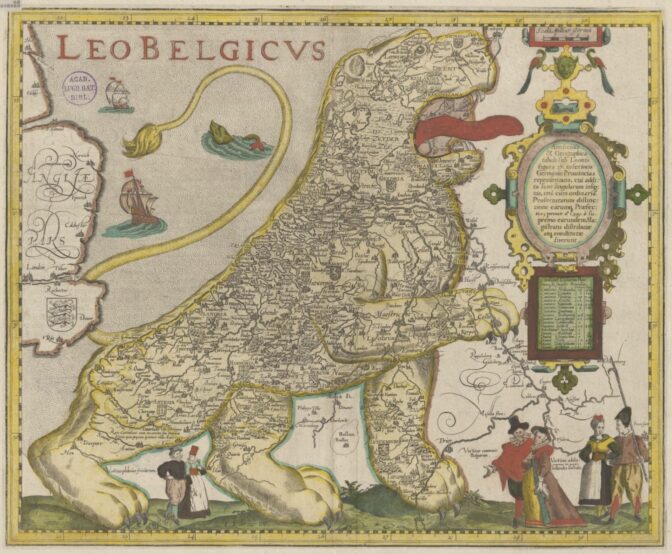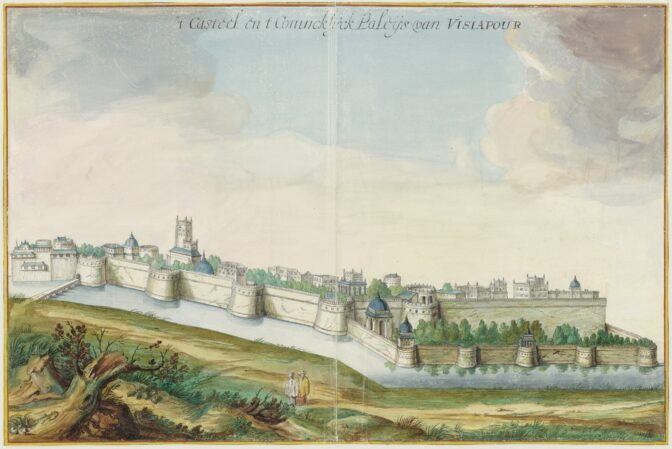Here are new sources and projects that were announced last month.
Sources
- The records of the Bishop of ‘s-Hertogenbosch between 1559 and 1650 have been digitized and are now available via the website of the Brabants Historisch Informatie Centrum. The records of the bishop are in finding aid 2147, the old parish files are in finding aid 2074, and a separate index has been created to easily find the appointments, ordainments, and verdicts.
- Scans of the baptismal, marriage, and burial books of Nijmegen before 1907 have been added to the genealogical database of the Regionaal Archief Nijmegen.
- The records of government service for the IJsselmeerpolders have been digitized and are available at the website of Het Flevolands Archief. This record group contains records of the newly created Flevoland province of the Netherlands, including records relating to the colonization of the land.
- The Utrechts Archief is now using artificial intelligence to automatically assign tags to their image collection.
- The genealogical indexes of the Westfries Archief, that includes municipalities like Hoorn and Enkhuizen, are now available via WieWasWie.
- The Leiden University Libraries has made more than 20,000 maps, atlases, and topographical prints and drawings available in their Digital Collections.

Leo Belgicus map, 1617. Credits: P. Kaerius, collection Leiden University Libraries (public domain)
Archives
- Archives have closed again as a result of the lockdown in the Netherlands. Several archives that provide scanning-on-demand have stopped the service or are experiencing slower delivery times.
- The municipal archives of Schouwen-Duiveland in Zeeland will now be kept by the Zeeuws Archief. The records and reading room will remain in Zierikzee. The genealogical records of Schouwen-Duiveland have mostly been transferred to Zeeuwen Gezocht already. [Source: Zeeuws Archief]
- The archives of the former municipality of Haaren will be moved to the Regionaal Archief Tilburg. [Source: Regionaal Archief Tilburg]
- As of 2021, the Flevolands Archief will become an independent organization. For the first four years, it was part of the Utrechts Archief. [Source: Het Flevolands Archief]
Projects
- A new collaboration project between the Netherlands and India, Cosmos Malabaricus, will start in 2021. The goal is to digitize the Dutch East India Company records about the Malabar coast of India. [Source: Nationaal Archief]
- In 2020, the Kingdom of the Netherlands awarded proposals for several Dutch-American cultural projects, including digitization of Dutch Papers at Calvin University and Hope College and several projects help inform the general public of New Netherland history. [Source: Dutch Culture USA]
- Several archives in Noord-Holland will be doing a pilot offering chat-services. The Noord-Hollands Archief, Regionaal Archief Alkmaar, Gemeentearchief Zaanstad, Westfries Archief, and Waterlands Archief will join in the project that will offer chat services every morning during the week plus two evenings. [Source: Noord-Hollands Archief]
- The Noord-Hollands Archief is starting a volunteer project to use artificial intelligence to tag the photo collection of the De Boer press agency, which contains over 2 million photos from the period 1945-2005. Volunteers can join the Vele Handen project.
- The Streekarchief Hollands-Midden is doing a project to index the population registers from Gouda, Krimpel aan den IJssel, Krimpenerwaard, Waddinxveen, and Zuidplas. The project is making good progress and 90% is done and verified. The results will be available at the Streekarchief Midden-Holland website.
- The Historisch Centrum Overijssel has started a project to index the resolutions by the city of Deventer 1566-1795. Volunteers can join the Mijn Stad Mijn Dorp project.
- The Nationaal Archief and Huygens ING started a crowdsourced project to help correct 50,000 computer-generated transcriptions of the resolutions of the Estates-General. The corrections will help to train the computer to improve the transcriptions. Volunteers can join the Vele Handen project.

View of Visiapour castle, India, about 1665. Credits: Johannes Vingboons, collection Nationaal Archief (public domain)
Laws
- The cabinet has agreed to modernize the archive law of 1995, which is less suitable to dealing with digital information. One major change is that records will be turned over to archives after 10 years (now 20 years), and if government organizations want to restrict access they have to provide better motivation. [Source: Rijksoverheid]
- The copyright law has been changed, making it easier for heritage institutions to make works from their collection available online, even if the work is still protected by copyright. [Source: Staatsblad 2020, 558]

